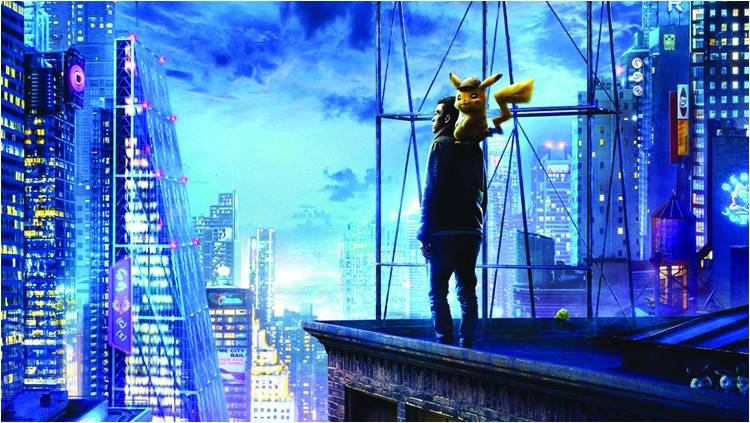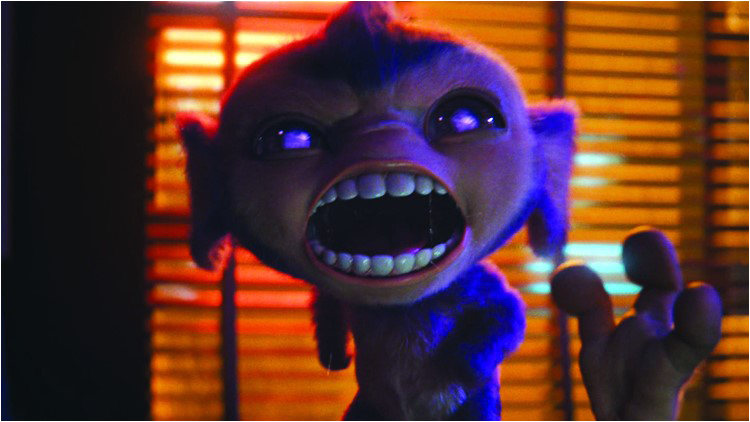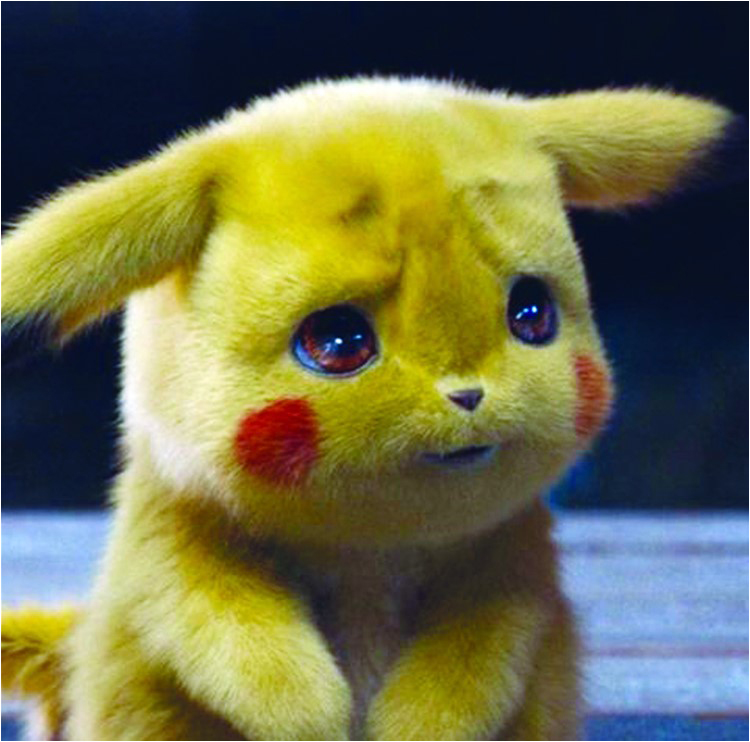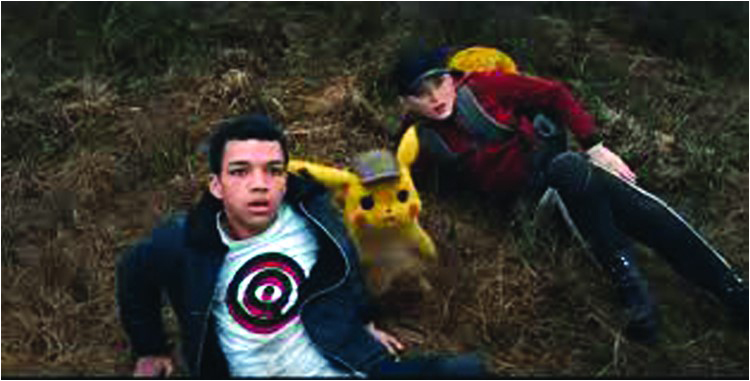
Before the festivities of Eid-ul-Fitr bring with them a barrage of Lollywood releases competing for fairly less interested eyeballs, multiplexes continue to be dominated by fictional realms in Ramzan.
Among these is Pokemon Detective Pikachu, which not only transports you into its own fantasy world, but simultaneously vies to keep you hooked through a thrilling mystery.
In the fictional Ryme city, where humans and Pokemon co-exist, detective Harry Goodman goes missing. His son Tim (Justice Smith) thereon makes it his mission to find him.
Tim finds help in his father’s partner Detective Pikachu (Ryan Reynolds). While it is believed that Harry Goodman (also, Ryan Reynolds) has been killed in an accident, Tim is determined to prove that something fishy is at play.
Tim has never really been fond of Pokemon, which becomes a bit of a test when he actually has to work with one. While Pikachu can’t communicate with anyone else, he can talk to Tim.

As events unfold, Pikachu and Tim realize that certain elements at play are threatening the peaceful co-existence between Pokemon and humans. The entire Pokemon universe could be in danger.
Reynolds does a fine job in lending a range of voice to his characters. The same is true for Smith, along with Kathryn Newton who plays a reporter Lucy Stevens, Bill Nighy as Howard Clifford, the Clifford Enterprise founder, and other characters.
Any animated film would be gauged on its imagery, special effects and other design elements. Ryme city is depicted as a theme park crossover between New York, London and Tokyo. The Pokemon mythology is meticulously, and artistically, incorporated in an urban setting with bright neon signs and skyscrapers.
However, midway through the film, you might ask yourself if over-reliance on CGI has taken away some of the traditional aura of the Pokemon Universe.

The development of human characters is not quite at the same level as the Pokemon. The imbalance reflects in the plot, which on instances struggles with the tempo.
Perhaps the one obvious shortcoming of Pokemon Detective Pikachu lies in just how much it tries to cater to a unique audience in addition to the already existing humongous fan-base. That quest is jarred by a palpable desire to be taken more seriously than just a fun animated movie for children.
Eventually, it ends up confusing the younger lot, without truly convincing the adults, who might find it a bit shallow – at least in parts.
A note for the significant number of people who would plan to watch the film with children: that thing you do after the credits run where you discuss the plot and characters with the younger lot might be slightly harder here, since the movie you would’ve just watched puts forth visuals as its forte. The imagery can of course only be enjoyed in the moment.
There’s a range of violence with Pokemon battling each other and humans, but nothing too graphic for children. Unless you want to protect your children from any and every form of visual depiction of destruction, the film is only packed with action that is safe for the young ones to enjoy – which they undoubtedly will.
Of course, the humour characteristic to Pikachu shines throughout the film and is undoubtedly one of the film’s strong points. The legendary Mewtoo (Rina Hoshino and Kotaro Watanabe) also adds a lot of life to the screenplay as one would expect.

No one would be surprised if Detective Pikachu is the dawn of a franchise which, based on the first film’s performance at the Box Office, could lure in more viewers for the Pokemon Universe.
Pokemon Detective Pikachu might not achieve that on its own, but it has set the ground for the upcoming films, with the rules set and visuals defined. The next step would be to take the writing up a few notches.
Among these is Pokemon Detective Pikachu, which not only transports you into its own fantasy world, but simultaneously vies to keep you hooked through a thrilling mystery.
In the fictional Ryme city, where humans and Pokemon co-exist, detective Harry Goodman goes missing. His son Tim (Justice Smith) thereon makes it his mission to find him.
Tim finds help in his father’s partner Detective Pikachu (Ryan Reynolds). While it is believed that Harry Goodman (also, Ryan Reynolds) has been killed in an accident, Tim is determined to prove that something fishy is at play.
Tim has never really been fond of Pokemon, which becomes a bit of a test when he actually has to work with one. While Pikachu can’t communicate with anyone else, he can talk to Tim.

As events unfold, Pikachu and Tim realize that certain elements at play are threatening the peaceful co-existence between Pokemon and humans. The entire Pokemon universe could be in danger.
Reynolds does a fine job in lending a range of voice to his characters. The same is true for Smith, along with Kathryn Newton who plays a reporter Lucy Stevens, Bill Nighy as Howard Clifford, the Clifford Enterprise founder, and other characters.
Any animated film would be gauged on its imagery, special effects and other design elements. Ryme city is depicted as a theme park crossover between New York, London and Tokyo. The Pokemon mythology is meticulously, and artistically, incorporated in an urban setting with bright neon signs and skyscrapers.
However, midway through the film, you might ask yourself if over-reliance on CGI has taken away some of the traditional aura of the Pokemon Universe.

The development of human characters is not quite at the same level as the Pokemon. The imbalance reflects in the plot, which on instances struggles with the tempo.
Perhaps the one obvious shortcoming of Pokemon Detective Pikachu lies in just how much it tries to cater to a unique audience in addition to the already existing humongous fan-base. That quest is jarred by a palpable desire to be taken more seriously than just a fun animated movie for children.
Eventually, it ends up confusing the younger lot, without truly convincing the adults, who might find it a bit shallow – at least in parts.
Midway through the film, you might ask yourself if over-reliance on CGI has taken away some of the traditional aura of the Pokemon Universe
A note for the significant number of people who would plan to watch the film with children: that thing you do after the credits run where you discuss the plot and characters with the younger lot might be slightly harder here, since the movie you would’ve just watched puts forth visuals as its forte. The imagery can of course only be enjoyed in the moment.
There’s a range of violence with Pokemon battling each other and humans, but nothing too graphic for children. Unless you want to protect your children from any and every form of visual depiction of destruction, the film is only packed with action that is safe for the young ones to enjoy – which they undoubtedly will.
Of course, the humour characteristic to Pikachu shines throughout the film and is undoubtedly one of the film’s strong points. The legendary Mewtoo (Rina Hoshino and Kotaro Watanabe) also adds a lot of life to the screenplay as one would expect.

No one would be surprised if Detective Pikachu is the dawn of a franchise which, based on the first film’s performance at the Box Office, could lure in more viewers for the Pokemon Universe.
Pokemon Detective Pikachu might not achieve that on its own, but it has set the ground for the upcoming films, with the rules set and visuals defined. The next step would be to take the writing up a few notches.

